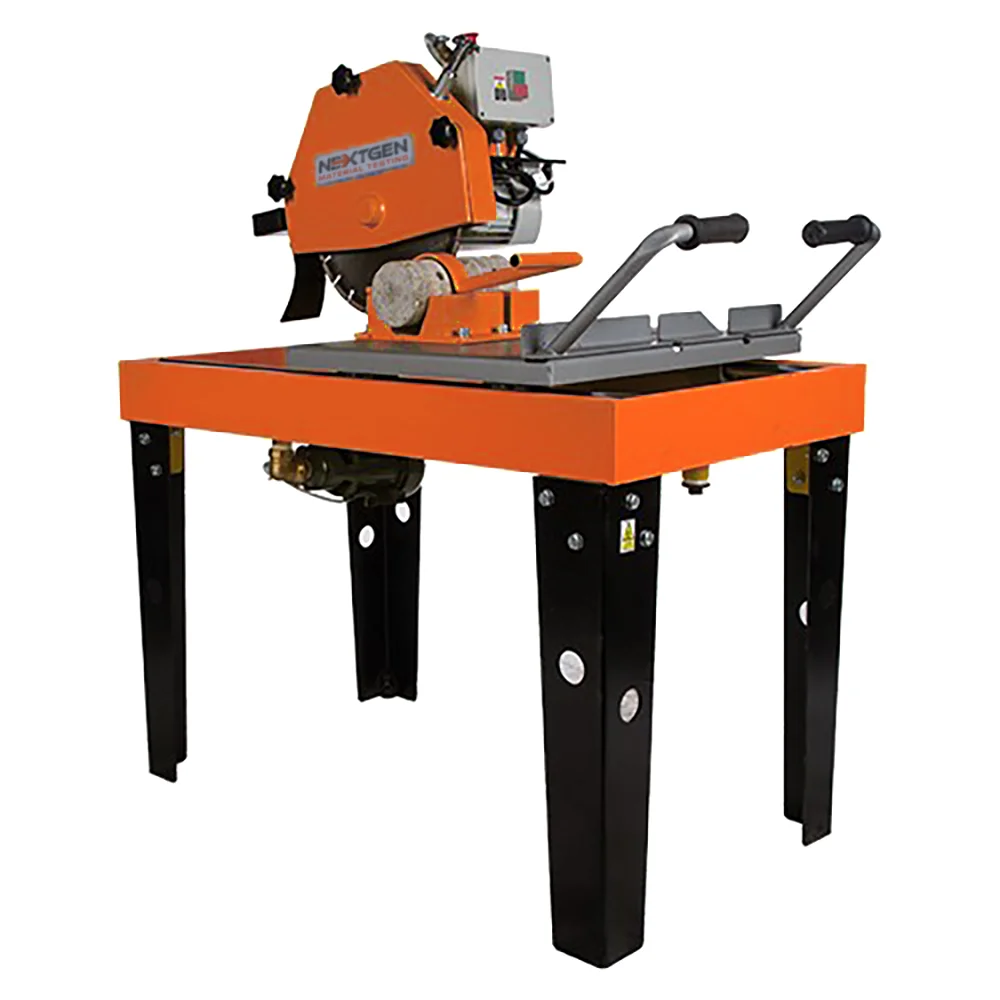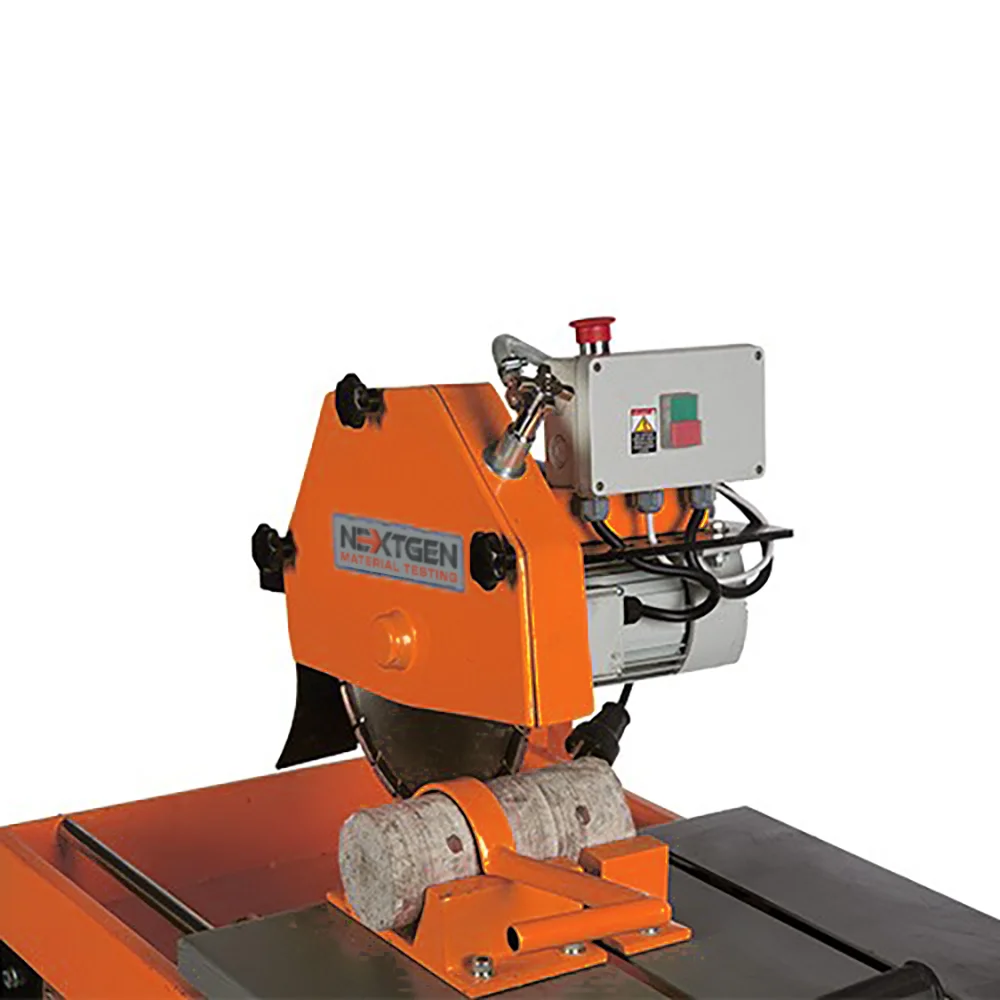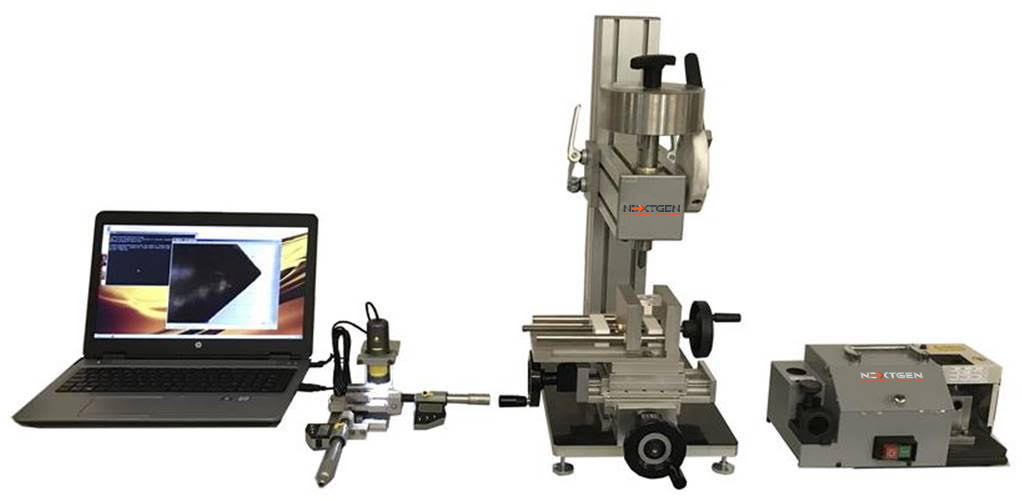Rock Core Cutter and Saw for Rock, Concrete, and Masonry Materials is a specialized instrument designed for cutting hard materials such as rock, concrete, and masonry. Due to its exceptional accuracy and efficiency, it is often considered an essential tool in many fields, such as geology, construction, and archaeology. Here we present our NextGen Rock Core Cutter and Masonry Saw, a cutting-edge tool set that redefines industry standards. This machine offers unmatched precision and efficiency when it comes to preparing samples of some of nature’s most challenging materials.
This cutter and saw combination is not just a tool, but a testament to the advancement in material testing technology. No matter whether a geologist is carefully examining the inner secrets of a rock sample, a construction expert is assessing the integrity of concrete, or an archaeologist is unveiling historical artifacts, the machine stands as an indispensable tool.
However, let’s review our product one piece at a time. Throughout this blog, we will explore the capabilities and applications of the Core Cutter and Saw, revealing how it is set to revolutionize material analysis and testing. If you are looking for a similar tool, this blog will give you all the information you need about a product that will be the right choice for you.
Introducing the Rock Core Cutter and Masonry Saw

Whenever you work with concrete, rock, or natural stone cores or test specimens, you should consider our Rock Core Cutter and Masonry Saw. It was expertly designed to handle the precision required by these materials, paving the way for improved material preparation.
Our product comes in two distinct models, each customized to meet specific requirements in the preparation of concrete, rock, or natural stone cores and test specimens. Among the most notable features of these machines is their special “V” block clamp assembly. Its innovation allows the specimen to be positioned correctly during cutting operations, a critical factor in producing accurate and reliable results.
Furthermore, the machines are equipped with a water circulation pump and cutting blade. As an option, a special clamp assembly is available as a separate order. You can customize these machines for specific projects.
We have taken into account the global diversity in electrical standards when designing a specific power supply. Machines can be powered by a 220V supply, which should be specified during order placement.
In addition to high performance and compliance with crucial operational criteria, the Rock Core Cutter and Masonry Saw comply with essential industry standards. Next, we’ll discuss how this equipment aligns with professional requirements, making it unique in the field of material testing and preparation. For those who work with materials like concrete, rock, and natural stone, we aim to provide a clear understanding of its role and capabilities.
NG-CoreTrim 450 Core Cutter and Saw
As previously mentioned, our product comes in two main models, one of which is the Rock Core Cutter and Masonry Saw NG-CoreTrim 450. For the preparation of test specimens, this equipment is designed as a universal cutting solution for hardened concrete, rock, and natural stone. Featuring a 450mm blade diameter and a maximum cutting stroke of 420mm, it can cut up to 175mm deep.

A special ‘V Block’ clamp assembly along with a water circulation pump are included with the NG-CoreTrim 450, as well as a fixing arm designed for 100 mm diameter samples. It is possible to order custom clamping fixtures separately.
Please note that cutting blades must be ordered separately. You can simplify your masonry cutting process with the NG-CoreTrim 450 – your ultimate CSA-certified masonry cutting solution.
Technical Specifications of NG-CoreTrim 450
To understand this model’s key features, let’s review its specifications:
-
Blade Diameter: 450mm
-
Cutting Depth: 17.5cm
-
Cutting Length: 42cm
-
Engine Power: 4HP – 380 V
-
Water Pump Power: 0.37HP – 220V
-
Weight: 298lbs / 135kg
-
Dimensions: 43.31″ x 27.95″ x 53.15″ / 110 x 71 x 135 cm
NG-CoreTrim 600 Core Cutter and Saw

The NG-CoreTrim 600 is the second model in the Rock Core Cutter and Masonry Saw lineup. For comprehensive testing, this model is capable of cutting hardened concrete, rock, and natural stone specimens precisely to the required sizes. A 600mm diameter blade facilitates a maximum cutting stroke of 500mm and a maximum cutting depth of 250mm.
The NG-CoreTrim 600 is also equipped with a V Block clamp assembly and a water circulation pump to enhance its utility. There is a fixing arm on this model that is designed for samples with a diameter of 100 mm, and custom clamping fixtures can be ordered separately. Note that cutting blades must be ordered separately for the NG-CoreTrim 600 as well.
Technical Specifications of NG-CoreTrim 600
Let’s review the specifications of this model to understand its specifications:
-
Blade Diameter: 600mm
-
Cutting Depth: 25cm
-
Cutting Length: 50cm
-
Engine Power: 5.5HP – 380 V
-
Water Pump Power: 0.37HP – 220V
-
Weight: 364lbs / 165kg
-
Dimensions: 48.03″ x 31.89″ x 59.06″ / 122 x 81 x 150 cm
Standards – The Cornerstone of Material Testing
Everything we use in our modern world is based on standards, from the food we buy at supermarkets to the screws in space shuttles. It is no exception for our Rock Core Cutter and Masonry Saw.
ASTM D4543, ASTM C42, EN 12390-3, and EN 12504-1 are among the key standards aligned with our product. Standards are not merely formalities, but a commitment to quality and precision. What each of these standards entails is as follows:
ASTM D4543: Quality Control in Rock Core Preparation

The ASTM D4543, “Standard Practices for Preparing Rock Core as Cylindrical Test Specimens and Verifying Conformance to Dimensional and Shape Tolerances,” is an essential standard in geotechnical engineering. It outlines the detailed procedures for preparing rock core samples obtained from field drill cores or block samples. A reliable test result requires accurate dimensional and shape tolerances, crucial to strength and deformation tests.
The significance of ASTM D4543 lies in its focus on strong rocks, generally those with strength greater than 7250 psi (50 MPa), and its application to stiff load frames without spherical seats. In such setups, non-uniform loading can negatively impact test results due to non-uniform loading. To address these challenges, ASTM D4543 prescribes stringent tolerance checks. Checks include length-to-diameter ratios, the straightness of elements on cylindrical surfaces, the flatness of end-bearing surfaces, and the perpendicularity of the end surfaces to the core axis.
Additionally, ASTM D4543 emphasizes the importance of the specimen’s moisture condition during preparation. A rock’s moisture content can dramatically affect its strength and deformation characteristics. In addition to guiding on maintaining field moisture conditions until testing, the standard also makes provisions for testing specimens at varying moisture contents, from saturated to dry.
By complying with this standard, the Rock Core Cutter and Masonry Saw guarantees that specimens produced are suitable for professional geotechnical analysis and meet industry standards.
ASTM C42: A Key Standard in Concrete Testing
ASTM C42, titled “Standard Test Method for Obtaining and Testing Drilled Cores and Sawed Beams of Concrete,” provides crucial information regarding concrete’s structural strength. The procedures provided in this standard determine concrete specimens’ compressive, splitting tensile, and flexural strength, key indicators of concrete quality and safety.
ASTM C42 is primarily used to address concerns about in-place concrete quality during construction. In the case of low strength or structural distress, this method helps determine the next step by analyzing the concrete’s core strength.
Additionally, the standard recognizes that concrete’s strength varies with its position within a structural element. For example, concrete at the bottom of a structure may exhibit different strength characteristics than at the top. Core specimens are oriented relative to the horizontal plane according to ASTM C42, which takes these variations into account. Orientation can have a significant effect on strength readings, so this is very important.
ASTM C42 also addresses the impact of moisture on concrete strength. To minimize the effects of variation on test results, moisture conditioning procedures are included in the method. It is particularly important to consider this factor since moisture content at the time of testing can have a significant impact on concrete’s strength and deformation characteristics.
Measured compressive strength of a core will generally be lower than that of a corresponding standard cylinder. Different factors can contribute to this discrepancy, including the concrete’s strength level, in-place temperature and moisture histories, and batch-to-batch differences.
EN 12390-3: Compressive Strength Testing
 EN 12390-3, titled “Testing Hardened Concrete – Part 3: Compressive Strength of Test Specimens,” is a widely used standard in construction and civil engineering. It specifies a methodology for determining concrete’s compressive strength, which is a fundamental property of its structural strength.
EN 12390-3, titled “Testing Hardened Concrete – Part 3: Compressive Strength of Test Specimens,” is a widely used standard in construction and civil engineering. It specifies a methodology for determining concrete’s compressive strength, which is a fundamental property of its structural strength.
The standard describes how specimens are properly cured and how loads are applied until failure. Quality control and compliance testing in construction projects are widely carried out using EN 12390-3, which measures concrete’s resistance to various loads and stresses. Construction concrete must meet certain strength specifications to be safe and durable, thus playing a significant role in building safety and infrastructure durability. By complying with EN 12390-3, concrete structures can withstand the intended loads safely.
EN 12504-1: Assessing Concrete’s In-Situ Strength
As part of EN 12504-1, which focuses on “Testing Concrete in Structures – Part 1: Cored Specimens – Taking, Examining, and Testing in Compression,” this standard is of great importance to construction engineers and civil engineers. Specifically, it focuses on obtaining and assessing concrete core samples from existing buildings for core quality and durability.
The purpose of this standard is to provide guidelines on how to extract cores from concrete, examine their condition, and estimate the concrete’s compressive strength, which will provide a better understanding of the concrete’s quality and structural integrity. Having an understanding of EN 12504-1 is essential for evaluating aging infrastructure and diagnosing issues in new construction. This makes sure that concrete structures can meet safety and durability standards over their long life.
The Best Users for Masonry Saws and Rock Core Cutter
Having reviewed our product’s information, standards, and specifications, and reviewed both models, an important question is – who needs these tools? It’s quite simple to answer.

Universities and Research Institutions
To start with, the Rock Core Cutter and Masonry Saw is highly beneficial to educational institutions, particularly universities, research institutions, and technical colleges. In material sciences, these tools bridge the gap between theory and practice by bridging the gap between theory and application.
These machines are indispensable for a variety of research projects at universities and research institutions. Geological, civil engineering and material science studies can use them to cut rock, concrete, and natural stone. Under different conditions, it provides a practical understanding of different materials’ properties and behaviors. This experience is crucial for students who will pursue careers in geology, civil engineering, materials science, and related fields. It also supports advanced research, enabling researchers to prepare accurate test specimens necessary for experimental work.
Technical Colleges
The Rock Core Cutter and Masonry Saw is also used as practical educational tools in technical colleges. These tools are used in teaching students about materials testing techniques and procedures. Often, technical colleges provide vocational and technical education. As a result, they gain a deeper understanding of how different materials are cut and prepared for testing, the importance of precision in these processes, and how these skills apply in real-world scenarios.
Getting hands-on experience in technical education is essential for verifying that students are job-ready and have a practical understanding of the materials they will work with.
Engineers in the Civil and Geotechnical Fields
For many professionals, especially those in engineering and quality control, the Rock Core Cutter and Masonry Saw is merely indispensable.
For engineers working in civil and geotechnical disciplines, accuracy in the sizing and testing of core specimens can make all the difference. With the Rock Core Cutter and Masonry Saw, these professionals can prepare test specimens from concrete, rock, and natural stone with unmatched precision.
It is necessary to analyze the structural integrity of materials used in construction projects with this precision. Whether it’s assessing the load-bearing capacity of a concrete pillar or the stability of a rock formation, engineers rely on the accuracy of their test specimens to make informed decisions. Cutting and sizing these specimens precisely has a direct impact on the reliability of their project analyses and designs, thereby affecting the safety and durability of their structures.
Quality Control Specialists
As a matter of course, quality control must be discussed as well. Having a Rock Core Cutter and Masonry Saw can be very useful to those who are responsible for verifying that materials meet specifications and standard requirements. Using the tool will guarantee the accuracy and consistency of quality assurance processes throughout the entire process.
Standardized test specimens enable quality control departments to assess the physical properties of materials like concrete and stone, ensuring that they meet the rigorous demands of the construction and manufacturing industries. In addition to maintaining high-quality standards, the Rock Core Cutter and Masonry Saw also contributes to the final product’s safety and reliability.
Construction Companies
In the construction industry, the precision of preparing and analyzing building materials directly affects the safety and durability of structures. Masonry Saws and Rock Core Cutters are used by construction companies for cutting hardened concrete, rock, and natural stone specimens. Analyzing and testing structural components require high levels of accuracy.
Construction companies can avoid potential structural failures and ensure compliance with safety regulations by making sure these materials meet the required strength and quality standards. Cutting and sizing these specimens accurately is critical to assessing the integrity and load-bearing capacity of construction materials.
Materials Testing Laboratories
Using the Rock Core Cutter and Masonry Saw helps to ensure that each specimen is consistent and meets the standards required for accurate testing by ensuring that each specimen is cut precisely. For laboratories to be able to provide reliable data on the physical properties of materials, such as strength, durability, and suitability for specific applications, it is vital to maintain this consistency in the data collection process. It is through the use of the Rock Core Cutter and Masonry Saw that these laboratories can maintain the high standards required for material testing and certification.
Geotechnical Testing Services
It is no secret that companies specializing in geotechnical testing rely on equipment such as the Rock Core Cutter and Masonry Saw as essential components of their work. It simplifies the process of preparing rock and concrete cores, thus streamlining the process of geotechnical investigations.
As part of these services, the ground can often be evaluated for its suitability for construction projects, the stability of natural rock formations can be assessed, and the physical properties of the subsurface materials can be determined. As a result of the accuracy and reliability of the Rock Core Cutter and Masonry Saw, it can prepare test specimens accurately, which is essential for comprehensive geotechnical analysis and reporting to be completed.
Combination with West Cerchar Abrasivity Index Tester

In addition, we must mention the integration of the Rock Core Cutter and Masonry Saw with a West Cerchar Abrasivity Index Tester. Combining these two systems offers a comprehensive solution for assessing and preparing hard materials, necessary for construction, mining, and geotechnical engineering.
Through our blog, we have demonstrated how The Rock Core Cutter and Masonry Saw excel at precisely cutting concrete, rock, and natural stone specimens, making them essential tools for sample preparation. By analyzing these precisely cut samples with the West Cerchar Abrasivity Index Tester, professionals can gain a more comprehensive understanding of the material’s properties. An Abrasivity Index Tester measures steel pin wear after scratching the sample to determine wear resistance. The data can be used to determine the durability of materials and how they may affect drilling and excavation equipment.
The synergy between these tools is of great value in practical applications. As a result, construction projects can be assessed accurately for material durability, helping to guide the selection of appropriate construction techniques and materials. Rock abrasiveness can inform the choice of drilling and cutting equipment, improving operational efficiency and equipment life in mines. Geotechnical engineers benefit from this combination by gaining comprehensive insights into soil and rock properties, vital to a successful project.
Combination like this improves material testing processes and contributes to more informed decision-making, leading to safer, more cost-effective, and more efficient project execution.
Summary of the Rock Core Cutter and Saws
NextGen Material Testing Inc.’s Rock Core Cutter and Masonry Saws, specifically the NG-CoreTrim 450 and NG-CoreTrim 600 models, set the standard for high-level material testing. Rock, concrete, and natural stone are just a few of the materials these advanced machines can prepare quickly and efficiently.
Each model of the NG-CoreTrim offers unique capabilities. NG-CoreTrim 450 has a blade diameter of 450mm and a cutting depth of 175mm, making it perfect for compact, precise tasks. In contrast, the NG-CoreTrim 600 is suitable for larger specimens or more demanding projects, thanks to its 600mm blade and 250mm cutting capacity. The “V” block clamp assembly on both models guarantees secure and accurate positioning during cutting.
The water circulation pump and customizable clamping fixtures enhance the functionality and adaptability of these machines, meeting a broad range of needs in a number of industries. Besides being tools, NextGen’s Rock Core Cutter and Masonry Saw is a testament to the company’s dedication to the advancement of material testing. Whether you’re a geologist examining rock samples, a construction expert evaluating concrete integrity, or an archaeologist uncovering historical artifacts, these machines are indispensable tools in your arsenal.
Please feel free to contact us directly or request a quote online. You can count on our team to assist you with your inquiries and provide customized solutions according to your specific needs. Providing you with the tools you need to achieve excellence in material testing is one of our top priorities at NextGen.
